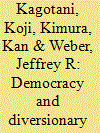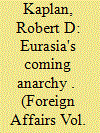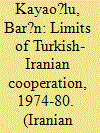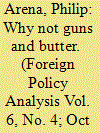| Srl | Item |
| 1 |
ID:
131386


|
|
|
|
|
| Publication |
2014.
|
| Summary/Abstract |
Since its democratization, South Korea's foreign relations with Japan have become increasingly volatile. We investigate the diversionary incentives behind these fluctuations in South Korean foreign policy during 1988-2011. We show evidence that, similar to mature democracies, economic turmoil is driving Korean leaders to divert the public attention toward low-intensity disputes against Japan. However, unlike mature democracies, our results reveal that public approval ratings and national elections do not encourage leaders to engage in the diversionary behavior due to South Korean domestic political institutional settings and party system. These findings highlight challenges to foreign policy making in a new democracy, an issue that has not been considered in detail in the literature. We conclude that although historical antagonism and US commitment to East Asia may affect the Japan-South Korea relationship, economic diversionary incentives significantly determine the fluctuations in Japan-South Korea disputes.
|
|
|
|
|
|
|
|
|
|
|
|
|
|
|
|
| 2 |
ID:
144024


|
|
|
|
|
| Summary/Abstract |
As China asserts itself in its nearby seas [1] and Russia wages war in Syria [2] and Ukraine, it is easy to assume that Eurasia’s two great land powers are showing signs of newfound strength. But the opposite is true: increasingly, China and Russia flex their muscles not because they are powerful but because they are weak. Unlike Nazi Germany, whose power at home in the 1930s fueled its military aggression abroad, today’s revisionist powers are experiencing the reverse phenomenon. In China and Russia, it is domestic insecurity that is breeding belligerence. This marks a historical turning point: for the first time since the Berlin Wall fell [3], the United States finds itself in a competition among great powers.
|
|
|
|
|
|
|
|
|
|
|
|
|
|
|
|
| 3 |
ID:
129000


|
|
|
|
|
| Publication |
2014.
|
| Summary/Abstract |
Why did Turkey and Iran fail to become close partners in the 1970s even though they had compelling reasons to do so? This article argues that mutual distrust between Turkish and Iranian leaders, domestic turmoil in the two countries, and diverging geostrategic priorities undermined Ankara and Tehran's efforts to deepen their relations. While the shah of Iran saw his country as the policeman of the Persian Gulf and the Middle East, successive governments in Turkey continued to look west for their security. As economic and political turmoil engulfed the two countries, leading to a revolution in Iran in 1979 and a coup in Turkey in 1980, Iranian and Turkish leaders could not forge a lasting partnership.
|
|
|
|
|
|
|
|
|
|
|
|
|
|
|
|
| 4 |
ID:
099757


|
|
|
|
|
| Summary/Abstract |
Diversionary approaches rarely explain why leaders use force in response to economic turmoil rather than addressing the problem directly. Those few studies that do address this often assume leaders can either respond with foreign policy or economic policy, but not both. I develop a formal model in which governments may employ macroeconomic policy tools, enter into an international crisis, or both. The results indicate that the relationship between economic conditions and the decision to use force may be either positive or negative. I discuss the implications with respect to recent empirical studies of the link between economic conditions and international conflict.
|
|
|
|
|
|
|
|
|
|
|
|
|
|
|
|
| 5 |
ID:
100268


|
|
|
|
|
| Publication |
2010.
|
| Summary/Abstract |
Diversionary approaches rarely explain why leaders use force in response to economic turmoil rather than addressing the problem directly. Those few studies that do address this often assume leaders can either respond with foreign policy or economic policy, but not both. I develop a formal model in which governments may employ macroeconomic policy tools, enter into an international crisis, or both. The results indicate that the relationship between economic conditions and the decision to use force may be either positive or negative. I discuss the implications with respect to recent empirical studies of the link between economic conditions and international conflict.
|
|
|
|
|
|
|
|
|
|
|
|
|
|
|
|